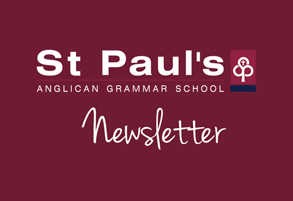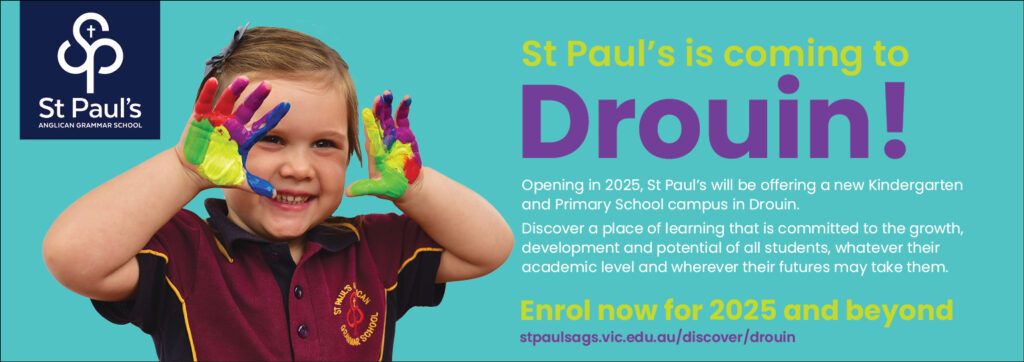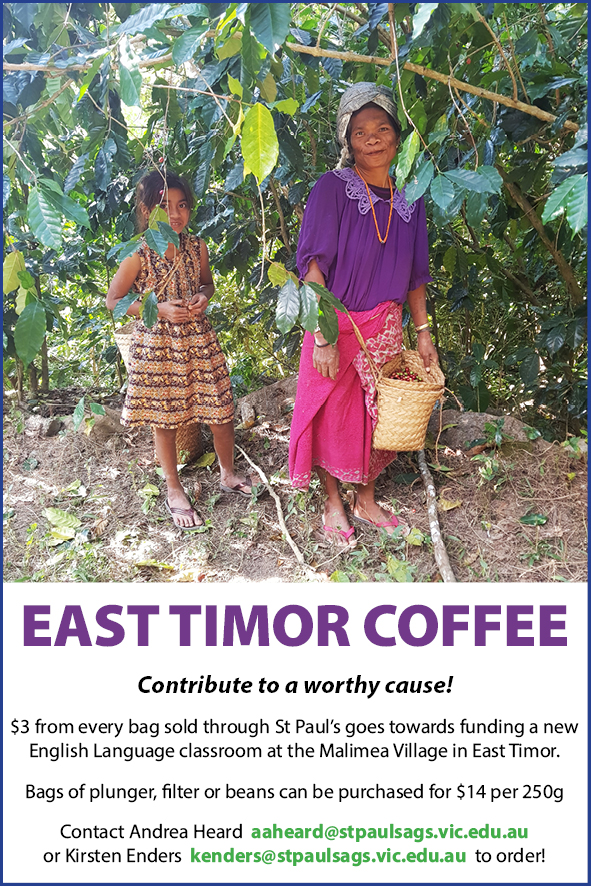In this issue
- Chaplain’s Chat
- Ponilala Trip
- Navigating a Negative Space
- Student Safety


From the Principal
Welcome to Term 2. Welcome to a new term at St Paul’s. Term 2 is eleven weeks long this year, concluding on Friday 28 June. I wish everyone well for the journey ahead. After a considerable absence of international tours at St Paul’s, following the onset of the global pandemic …
From the Principal
Welcome to Term 2.
Welcome to a new term at St Paul’s. Term 2 is eleven weeks long this year, concluding on Friday 28 June. I wish everyone well for the journey ahead.
After a considerable absence of international tours at St Paul’s, following the onset of the global pandemic in 2020, there were two tours during the recent school holidays. The language trip to New Caledonia was highly successful, as was our return to East Timor. Thank you very much to everyone involved. Details of these tours can be found elsewhere in this issue of the Grammarian.
Some people might be aware of my great interest in tennis. For me, therefore, Term 2 evokes memories and expectations of the French Open at Roland Garros, of one player in particular: Rafael Nadal. While I would love to see Rafa win yet another French Open, I fear that his age and long-term injury issues might see him disappointed.
Disappointments in life, of course, are inevitable. As much as possible, we must try to make the most of every situation, no matter how joyful or disappointing. American philosopher Henry David Thoreau maintained that “if we will be quiet and ready enough, we shall find compensation in every disappointment.” It is my hope that St Paul’s can be a place where people can find that inner peace, readiness and stillness referred to by Thoreau, for amidst the many joys there will be disappointment at times. I suspect that Rafa might relate to this as he enters this year’s French Open, ponders his future and reflects on the past.
“Disappointment to a noble soul is what cold water is to burning metal; it strengthens, tempers, intensifies, but never destroys it.” (Eliza Tabor)
I wish everyone well in the St Paul’s community during this second term. May it be full of achievement and joy, together with the peace and resilience needed for any tough times too.
Cameron Herbert
Principal
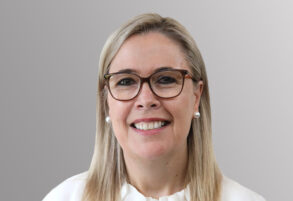
Warragul Secondary School
From the Head of Warragul Secondary School, Mrs Debbie Cameron. Easter Sunshine It is hard to believe that we are back at school and well …
Warragul Secondary School
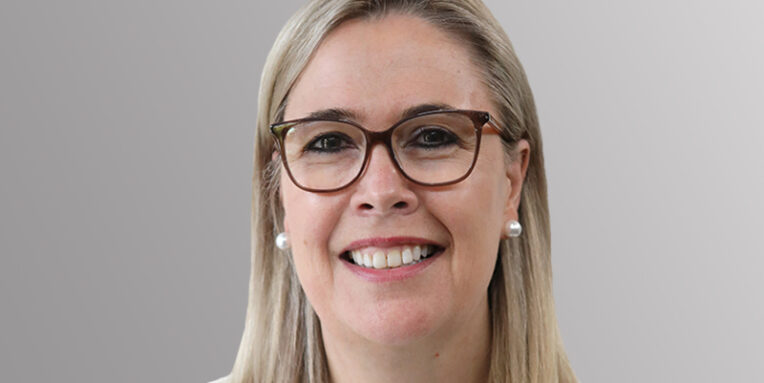
From the Head of Warragul Secondary School,
Mrs Debbie Cameron.
Easter Sunshine
It is hard to believe that we are back at school and well into the swing of learning after such a wonderful Easter break. I do hope that students, families and staff were able to enjoy the sunshine and time away from the regular routine of school and work. This term is going to be the longest of the year and we look forward to many exciting learning opportunities taking place combined with a nice balance of co-curricular and special events.
New staff welcome
It is my great pleasure to warmly welcome to our Warragul Secondary School teaching team Mr Wayne Rhodes who will be teaching Japanese. Wayne is passionate about Japanese culture and language, and we wish him well as he commences his professional journey with us. I have no doubt that our families and students will make him feel very welcome.
Spotlight on Careers
This week, our Year 10 students across both campuses will be sitting their Morrisby Assessments. Morrisby is a digital career exploration tool that involves initial profiling of each student to determine strengths, interests and values relating to current and future career options. It also provides significant career information that can be accessed across the student’s career journey to assist with decision-making and further career development and exploration. Upon completion, students will be able to access their results from 5:00 pm to read through with their family. Each Year 10 student will then be invited to a 20-minute one-on-one interview with the Head of Careers or Director of Studies, both having completed specialist training in the Morrisby program, to assist with unpacking the report and clarifying any questions the student may have. Parents are more than welcome to attend these interviews. Interview times will be sent out to students early next week. The interviews will commence the week of 29 April. I think this is such an invaluable and exceptional learning opportunity for students to experience and thank our Head of Careers, Sarah Luck, for providing this for our students.
Open Day 2024
We invite all our current families to share with their friends and families the details of our upcoming Open Day at the Warragul Campus on Saturday 4 May from 10:00 am until 2:00 pm. This is a wonderful opportunity for families and community members to speak with our staff and tour the campus.
To register your attendance please click here.
Education in the age of ‘Smart Machines’
During the second week of the holidays, the Head of Secondary at the Traralgon Campus, Mrs Leonie Clark, attended the AHISA (Associated Heads of Independent Schools Australia) Leading, Learning and Caring Conference, ‘Vision in Volatility’ in Sydney. The following is an article she has written for one of the sessions she attended:
It was indeed a privilege to hear from leading Australian educators and academics as they discussed and presented their research in relation to issues and topics facing contemporary students and educators. In this and subsequent Grammarian articles, I would like to share some of the ideas and thinking presented for contemplation at the conference. This week I humbly present for your consideration some of my key takeaways and reflections from the opening Keynote address ‘Mass Personalisation and Entrepreneurial Thinking: Education in the Age of Smart Machines’ by Dr Yong Zhao, PhD Foundation Distinguished Professor School of Education and Human Sciences University of Kansas and Professor in Education Leadership Faculty of Education University of Melbourne.
Dr Zhao commenced his address by suggesting that to improve education for individual students in the future, we must continue to support and encourage students to focus on their unique skills and abilities. He stated that ” … every talent is valued when coupled with entrepreneurial skills’ and that this would be absolutely necessary in the future, to allow students to ‘develop to greatness’ in the age of smart machines.”
Zhao emphasised that “we really have not learned how to be good to each other”, and “that we have not taught people to share their skills and talents in a healthy co-dependence” to ultimately benefit humanity. He suggested that those students in the future who develop their individual gifts and talents, collaborate in a mutually beneficial codependence, and apply their abilities to identify problems that require solving, subsequently resolving those problems for the benefit of humanity; will be successful in the age of smart machines. Furthermore, Zhao acknowledged that the identification of problems “worth solving” is and will continue to be the most challenging step in the process, while acknowledging that we need to explicitly teach children “how to find the problems worth solving”, while asking them to consider “Why does it matter?” And further interrogating the problem at hand by asking our children and students, “Why do you think you can do it better and why now?”
As a team of parents and educators, we can promote and foster “problem identification” and “problem-solving moments” with our children in precious teachable moments of conversation and discussion. Asking our students and children to identify problems when reading the newspaper, or watching the evening news, while simultaneously encouraging children to think critically, to question everything (particularly in the online world), to be curious about ways in which they might make their community or world a better place, to read widely, to thoroughly interrogate topics and to ponder broadly while considering possible solutions to everyday and global problems. It is in all of the little moments of stretching our thinking together and exploring with our children that we will assist the next generation to develop critical interrogative thinking and the entrepreneurial problem-solving skills that Zhao indicated will be needed to reach “greatness” while advancing and preserving humanity in an age of smart machines.
Digital Devices Health Check
As we head into the cooler months of the year when children spend more time indoors on devices, it is perhaps a good time to undertake a digital device health check. The eSafety commissioner website for parents and our very own St Paul’s/ySafe Safety Hub contain outstanding resources for parents and guardians to be able to manage and secure electronic devices. Unfortunately, pastoral concerns stemming from unsupervised mobile device use after hours, can from time to time, overflow into the school community and we encourage all families to visit the ySafe safety hub. Closely monitoring your child’s use of electronic devices and the setting of parental controls certainly avoids difficult conversations should things get a little out of hand. There is no doubt that it is a collective team effort to guide our children to use technology with care and respect for themselves and others. As always, your kind support is hugely appreciated to keep everyone in our community safe.
The education team at eSafety hosts webinars for parents and guardians each year. I have attached the Term 2 schedule below for your reference.
The Term 2, 2024 ESafety Commissioner Webinars include:
• eSafety 101: How eSafety can help (30 minutes) Suitable for parents and carers of children and young people in primary and secondary school.
• Wellbeing and digital technologies (30 minutes) Suitable for parents and carers of young people in secondary school.
• Consent and online boundaries: How to support your primary-aged child (30 minutes) Suitable for parents and carers of children in primary school.
• Setting your child up for success online (30 minutes) Suitable for parents and carers of children in primary school.
To register for the above eSafety Term 2 webinars visit this link.
Student Absentees
The parent/guardian of any absent student should contact the School to notify us of the student’s absence, preferably by 9:30 am. The absentee phone number is 5622 6103 or families can email Student Services. A note indicating the date/s and reason for absence should be sent with the student to hand to their Mentor when the student returns to school. Parents will receive an SMS on their mobile after 9:30 am if the student is absent with no notification.
Easter Bunny Visits St Paul’s
On the last day of Term 1, we had two special visitors arrive at school. Following a fabulous Easter Service delivered by Reverend Lowe with a message about Sacrifice and Service, Easter Bunnies hopped through the school grounds delivering Easter Eggs and greetings to the staff and students. Egg O Grams delivered by our Prefects raised over $120 towards our East Timor charity. It was a wonderful feeling of excitement on the last day of term and I hope that the students enjoyed a little chocolate treat.


Debbie Cameron
Head of Warragul Secondary School
WHAT’S ON
APRIL
19 April Year 9 Urban Experience Day 2, Group 1 (9MGT1 and 9MGT3), 7:06 am to 4:48 pm
Mountain Bike Training, Warragul Secondary School, 7:15 am to 8:15 am
Presentation Ball Training, Warragul Secondary School Gymnasium, 3:20 pm to 5:15 pm
22 April Live4Life Year 8 Launch Event, 9:15 am to 11:15 am
Presentation Ball Training, Warragul Secondary School Gymnasium, 3:20 pm to 5:15 pm
22 April to 24 April VET Sport and Recreation Mitchell River Bushwalking Camp
23 April SEISA Surfing
24 April Year 9 Faiths Excursion, Greater Dandenong area, 9:00 am to 3:10 pm
25 April ANZAC Day
26 April Rocky Trail Academy – Schools MTB Racing, Mt Buller
Presentation Ball Rehearsal, Lardner Park, 11:00 am to 3:00 pm
27 April Presentation Ball, 6:00 pm (doors open at 5:30 pm)
ST PAUL’S PARENT PRAYER GROUP
“Where two or three people gather in my name, I am there with them.” Matthew 18:20
The St Paul’s parent prayer group meets on the first Monday of each month during school terms. We try to keep the meeting brief (we are usually done by 9:45 am) and casual (younger children are most welcome). The group encompasses people both very comfortable with praying, as well as those newer to praying with others. Feel free to get in touch with any questions beforehand or just attend when you are able during the year.
Our next gathering is on Monday 6 May, at 9:00 am in the Prideaux Centre, Warragul Junior School
Contact: Sheryn Cutler 0417 158 937 or sheryn.cutler@gmail.com
DOBSONS UNIFORM SHOP
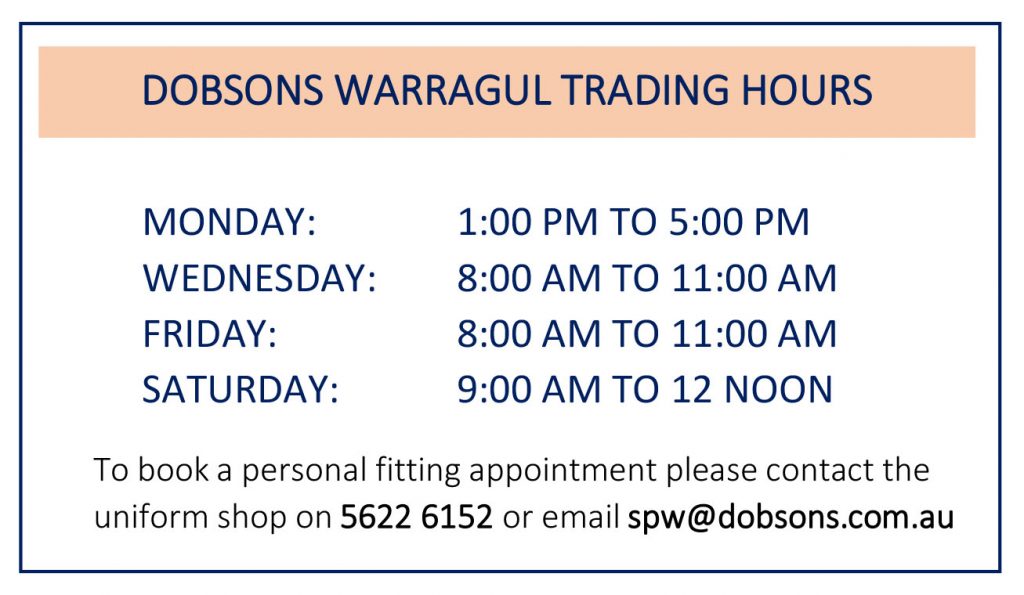 Order online or click and collect: Please ensure that you only attend the store to collect your items once you have received notification that your order is ready, order here.
Order online or click and collect: Please ensure that you only attend the store to collect your items once you have received notification that your order is ready, order here.
Negative News in the Media
The tragic events in Bondi over the weekend have been confronting for many children, adolescents and adults to watch and hear about. As parents, you may be wondering how to approach not only this event, but the constant stream of negative news portrayed in the media, with your children.
Limit exposure: As adults, we are often able to identify when we have reached our threshold of negative news for the day and know to engage in self-care at this stage. Children and adolescents may not have this insight and they may not fully understand all that they are seeing/hearing. As such, limiting their exposure to news media can be beneficial. It is generally advised that news media access be actively supervised and never used as background noise. If you are watching or listening to the news as a family and hear a warning about distressing content, or a warning that something may not be appropriate for younger audiences, change to something suitable for the whole family.
Have a discussion: Even if you avoid the news, children and adolescents are likely to hear about recent events from their peers. To avoid confusion or misunderstandings about events, it is important to be proactive. If possible, prepare for any discussions and make sure that these occur at a time when you feel calm and regulated. Remember that children and adolescents often watch their parents for cues about how they should feel about situations. Ask your child what they have heard about recent events and correct any misinformation. Deliver age-appropriate information in a clear and honest manner. Sometimes programs like Behind the News can provide age-appropriate information to use as a springboard for further discussion. Remind your child that they can come to you with any questions they may have.
Ask your child how they are feeling: Seeing violent events on a screen can be as traumatic as witnessing them in real life, particularly for children and adolescents. It is important that you check in with your child about how they are feeling about recent events. Avoid statements that dismiss their feelings, and instead validate and normalise these. Offer appropriate reassurance, perhaps by reminding your child that such events are rare, that professionals/experts are managing the situation, or by providing context that helps them to understand that they are not at risk.
Watch out for signs of distress: Children and adolescents may not be able to verbally articulate if they are feeling distressed by what they have seen or heard in the media. It is important to maintain open communication with your child, as well as to watch for changes in their behaviour. Behavioural changes may include an increase in nightmares, sudden sleep reluctance, appetite changes, separation anxiety, withdrawal, emotional dysregulation or feeling unwell.
Maintain routines: Routines provide a sense of safety and security to children and adolescents. Keeping your family routine as consistent as possible is likely to be helpful during distressing times. Increasing connection and engaging with friends and family can also be beneficial.
Seek support: If your child seems distressed by something they have seen or heard, reach out for support. The St Paul’s Anglican Grammar School Counselling team is available to provide support to students in need. To arrange a session, speak to your child’s classroom teacher, Head of Year, or Deputy Head of School. Remember that services like Kids Help Line (1800 55 1800), Lifeline (13 11 14), Beyond Blue (1300 224 636) and Headspace (1800 650 890) are available to provide telephone and online support outside of school hours.
Shannon Staples
Head of Counselling Services
Senior Student Trip to East Timor – Ponilala
A recent senior student trip to the Ermera District of East Timor provided a glimpse into the life and traditions of the Timorese people, leaving a lasting impression of friendship and cultural richness. “The people I’ve made friends with, the Timorese and Aussies [fellow participants], will always be treasured.” (Asmi)
From the moment our group arrived, we were greeted with open arms by the friendly Timorese locals, “[they] remind you what it means to be grateful and happy” (India). Their warm smiles and genuine curiosity about our journey made us feel instantly welcomed and at home.
One of the highlights of our trip was our visit to Ponilala Secondary School (partly funded by St Paul’s in 2007). Ponilala is situated in the hills of Ermera, overlooking the large town of Gleno and its isolation excludes it from regular visitors. After a traditional welcome with open arms and warm hearts, we stepped into the Ponilala secondary classroom, a room in stark contrast to what our students were expecting; we were greeted with a sea of smiling eager students squeezed into old wooden desks, a chalkboard and sadly, a lack of resources.
The day kicked off with vibrant displays of traditional Timorese dancing and singing, showcasing the rich heritage and artistic talent of the community. In the spirit of cultural exchange and in somewhat of a contrast, our students reciprocated by sharing the familiar dance moves of Timber and the iconic Nutbush dance. The laughter and shared moments on the dance floor brought us together and created memories that will last a lifetime.
The delivery of the English/Tetun dictionaries kindly donated by so many generous St Paul’s families was met with overwhelming appreciation as you can see in the students’ faces! This simple act will have a profound impact on their English learning journey and was truly appreciated by the teaching staff as well, who were quick to ask for their own copies too.
Another special moment was the gifting of a beautiful guitar in a brand-new case, a pre-trip call-out responded to by a parent and our Performing Arts faculty. It brought so much joy not only to the very talented music teacher at Ponilala but also to the students and staff. In true Timorese fashion, the best way to show appreciation was to celebrate with a traditional and beautiful song.
Amidst the festivities, a Timorese luncheon was laid out to honour our visit and to show appreciation for the ongoing support and friendship extended by St Paul’s. This delicious gesture of gratitude and hospitality came with an apology they had nothing else to gift us in return for years of connection. However, being able to help and support such a warm, inclusive and resilient community is more valuable than any tangible gift.
As the day progressed, the senior Ponilala students showcased their creativity and scientific knowledge through experiments using basic items like old bottles, tin cans, candles and steel wool, to name a few. From homemade models, they demonstrated an understanding of scientific concepts, serving as a reminder of the power of education and the potential that lies within every young mind, regardless of their circumstances.
As our day at Ponilala drew to a close, our hearts were full and bonds were strengthened. As a group, we learned much about resilience, gratitude and the importance of friendship and connections, and how much our support means. “Getting to know children at the schools we have supported has allowed me to put into perspective the reason we fundraise for these communities.” (Ella).
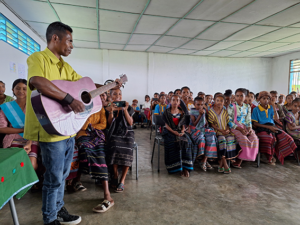
The gift of a guitar means so much to this community.
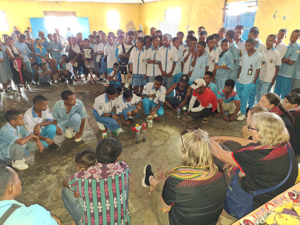
Senior students proudly showing us their science experiments using basic items.
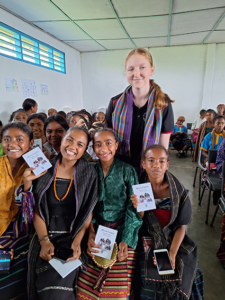
Ella giving out the much-appreciated gift of a dictionary.
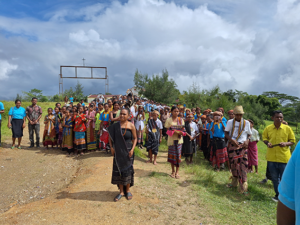
A traditional warm welcome.
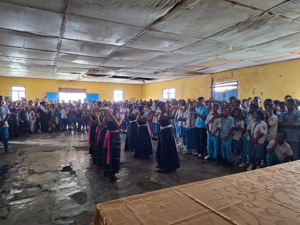
A traditional dance performance.
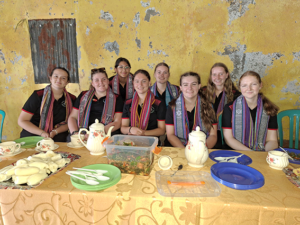
Bella Sellers, Sophia Hastie, Asmi Pathania, Chloe Davidson, Sienna Smith, Alice den Houting, India Van Berkel, Ella May.
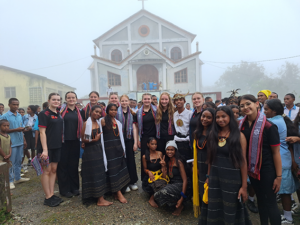
Our students connecting some of the Ponilala locals.
Teachers: Kirsten Enders, Andrea Heard, Jan Park.
Students: Ella May, Asmi Pathania and India Van Berkel
WARRAGUL CAMPUS ENSEMBLE SCHEDULE
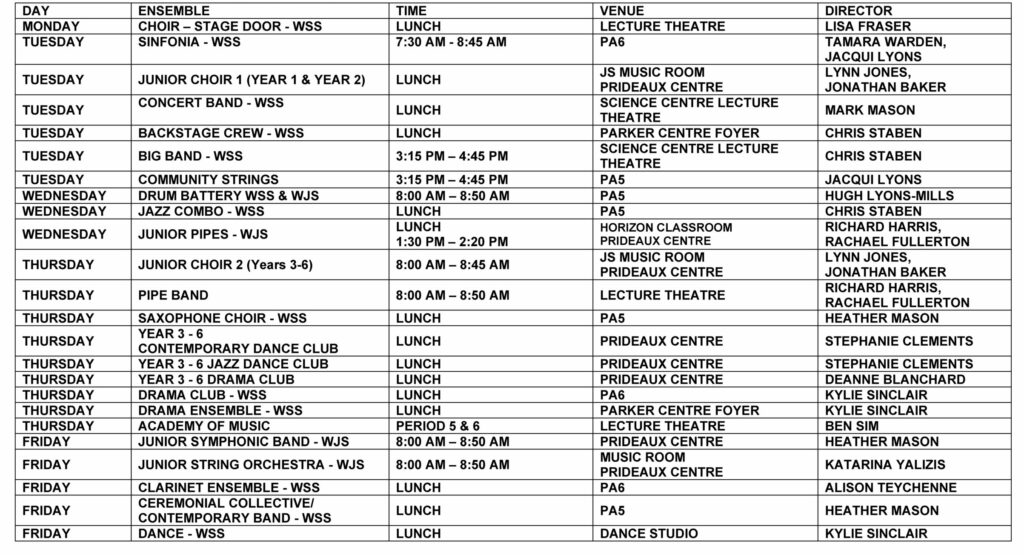
New members, including students receiving tuition outside of school, are most welcome. Please contact Mrs Heather Mason, and/or the listed ensemble director for further information hjmason@stpaulsags.vic.edu.au .
Heather Mason
Head of Performing Arts – Co-Curricular
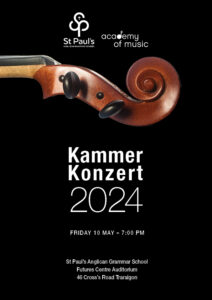
ALUMNI REUNIONS
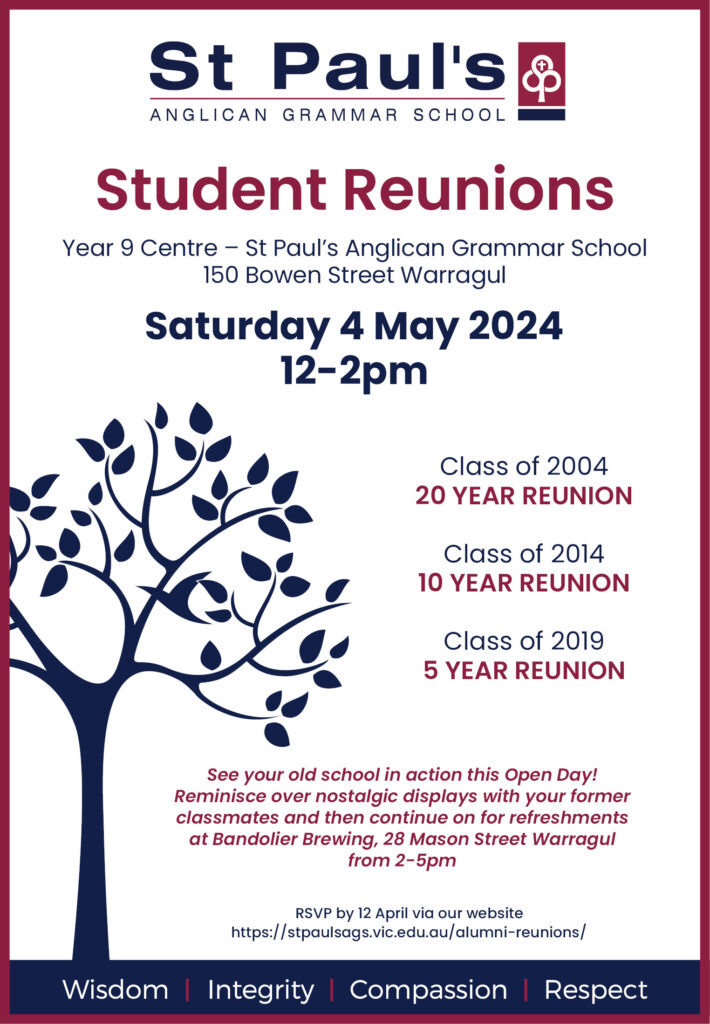
Saturday 4 May 2024
Year 9 Centre, St Paul’s Anglican Grammar School, 150 Bowen Street Warragul
• Class of 2019 – 5 Year Reunion
• Class of 2014 – 10 Year Reunion
• Class of 2004 – 20 Year Reunion
This year we have brought forward the timing of our Alumni Reunions to coincide with the school’s annual Open Day. Moving the reunions earlier provides us with a wonderful opportunity to celebrate and tour the school in action, see how it has changed and meet some of the current St Paul’s students and staff. Please join us at any stage between 10:00 am and 2:00 pm, chat with our Alumni representatives and reminisce over the range of memorabilia on display. You might also like to join the Alumni school tour which will take place at 12:30 pm, before continuing your celebrations with some drinks, nibbles and catch-ups at Bandolier Brewing, 28 Mason Street Warragul, from 2:00 pm to 5:00 pm.
Please RSVP by completing the registration here.
Michelle Ireland
Community Coordinator
alumni@stpaulsags.vic.edu.au
FROM THE FINANCE OFFICE
Private Car Conveyance Allowance
Families driving students more than 4.8 kilometres to attend St Paul’s Anglican Grammar School may be eligible to receive a conveyance allowance. For further information on the eligibility criteria and application process, please refer to https://www2.education.vic.gov.au/pal/conveyance-allowance/policy
Eligible families applying for the car conveyance allowance will have funds credited to their fee account during the year. If the fee account has been paid in full, or is on a direct debit arrangement, any allocation will show as a credit on the following year’s invoice.
The Camps, Sports and Excursions Fund (CSEF)
The Camps, Sports and Excursions Fund (CSEF) provides payments directly to the school for the benefit of the eligible student to attend camps, sports and excursions. Families holding a valid means-tested concession card or temporary foster parents are eligible to apply. $125 per year will be paid for eligible primary school students and $225 per year paid for eligible secondary school students. Payments will go directly to the school and be tied to the student. For more information and to download the application form please go to https://www2.education.vic.gov.au/pal/camps-sports-and-excursions-fund/resources
Parents are encouraged to lodge the application form immediately. The CSEF program for 2024 closes at the end of Term 2. All forms must be received by 24 June 2024 to be processed.
For parents who received CSEF at the school in 2023 (and the student/s are still enrolled in 2024), the schools will ‘copy’ the application across from 2023 to 2024 on the CSEF system. The CSEF system will automatically validate the parent’s eligibility with Centrelink.

Warragul Junior School
From the Head of Warragul Junior School, Mr Rowan van Raay. Welcome to Term 2 Welcome to Term 2 everyone. I hope you were able …
Warragul Junior School

From the Head of Warragul Junior School,
Mr Rowan van Raay.
Welcome to Term 2
Welcome to Term 2 everyone. I hope you were able to enjoy some downtime over the Easter and holiday break. It is always nice to have a change of pace to recharge.
We welcome Miss Begg back from long service leave. We thank Ms Laughlin who has been filling in for Miss Begg and wish her well as she heads off on leave at the end of next week with the pending arrival of her first baby.
Best wishes to Mr Rock as he gets married tomorrow.
We also welcome Charlie Gibbons and his family to our Junior School. Charlie commenced in Year 3W1.
Traffic flow
As per my email correspondence to all families on Monday, a reminder that we have received information from the Baw Baw Shire in relation to the Brooker Park car park upgrade works. Works are expected to take approximately eight weeks, during which time the carpark will be inaccessible. We are unsure what access to the school there will be.
In light of the anticipated increased traffic during drop-off and pick-up times on campus, we have kindly requested families with children in Years 5 and 6 and/or Secondary School to utilise the Secondary School pick-up area instead of the Junior School lane. Students would walk across with the bus walk over group with staff and meet their parents at the Secondary School at 3:30 pm. The Secondary School finishes at 3:10 pm each day and their pick-up area is usually clear by this time. This adjustment would potentially save time for parents, reduce congestion and allow us to better manage the flow of traffic at the end of the day. Please email us at WarragulJuniorAdminStaff@stpaulsags.vic.edu.au or call 5622 6131 if you are happy to make this adjustment and we will ensure your child/ren is added to our ‘walk over’ list.
Could I also remind families not to park and leave their car unattended in the pick-up lane after 3:15 pm, as this affects our traffic flow at the end of the day.
State Swimming
We wish Sasha Reidy (5W3) all the best as she represents St Paul’s at the State Swimming Championships today. This is an outstanding achievement and Sasha should be proud of her efforts.
Year 6 Regional Tennis (individual)
Year 6 students, Peter Baker, Henry James, Jimmy Joyce-Biss and Siena Rikken will compete at the Regional Tennis tournament next Wednesday and we wish them well.
Year 6 Camp
Year 6 families will have received information regarding our upcoming Year 6 camp last week via Consent2Go. If you have not accessed this information as yet, could I please ask that you do this ASAP as the camp is in Week 3.
ANZAC Day Service
Junior School students will join with the Secondary School at the Lone Pine next Wednesday for our Prep to Year 12 ANZAC Day Service. My thanks to Mr Barkla and the students who will be involved in running the service. Our Junior School Captains, Anneke and Luke will attend the service in Warragul on ANZAC Day the following day. We have ANZAC and poppy badges for sale in the office – poppy badges are 20 cents and ANZAC badges are $1.
Uniform
A reminder that from Monday 29 April, students in Years 3 to 6 must wear the winter uniform, including the school blazer to and from school each day (students may wear shorts).
School Photos – Friday 17 May
School photos will be taken on Friday 17 May commencing with sibling photos from 8:30 am. A flyer showing how to register will be emailed to families soon and I ask that you register for sibling photos. Parents will order their photos online using their unique image codes that will be issued to all students on 17 May. Registration is simple, just follow the three simple steps on your child’s personalised flyer and remember to add the codes for all your children attending our school. Even if you registered last year, it is important that you do again this year using your child’s 2024 image code to link their images for the current year with your contact details. When images are ready to view and in the webshop, all parents who have registered will be notified by SMS and email. Once registered, please wait for notification that 2024 images are online to view before making your purchase.
Rowan van Raay
Head of Warragul Junior School
WHAT’S ON
APRIL
19 April State Swimming (selected students)
24 April ANZAC Day Service
25 April ANZAC Day Public Holiday
26 April Years 3 to 6 Cross Country
30 April to 3 May Year 6 Camp
MAY
6 May Parent Prayer Group
7 May Anniversary Service
9 May Year 2 Coal Creek Excursion
10 May Mother’s Day Stall
17 May Family and School Photos
20 May Division Cross Country (selected students)
22 May National Simultaneous Storytime
JUNE
3 June Years 3 to 6 District Winter Sports
Parent Prayer Group
7 June Year 3 Scienceworks Excursion
10 June King’s Birthday Public Holiday
13 June Performing Arts Showcase, 7:00 pm (selected students only)
14 June Student Free Day
28 June End of Term 2, 2:20 pm finish
From the Traralgon Head of Secondary School
Education in the age of ‘Smart Machines’
It was indeed a privilege to hear from leading Australian educators and academics as they discussed and presented their research in relation to issues and topics facing contemporary students and educators. In this and subsequent Grammarian articles, I would like to share some of the ideas and thinking presented for contemplation at the conference. This week I humbly present for your consideration some of my key takeaways and reflections from the opening Keynote address ‘Mass Personalisation and Entrepreneurial Thinking: Education in the Age of Smart Machines’ by Dr Yong Zhao, PhD Foundation Distinguished Professor School of Education and Human Sciences University of Kansas and Professor in Education Leadership Faculty of Education University of Melbourne.
Dr Zhao commenced his address by suggesting that to improve education for individual students in the future, we must continue to support and encourage students to focus on their unique skills and abilities. He stated that ” … every talent is valued when coupled with entrepreneurial skills’ and that this would be absolutely necessary in the future, to allow students to ‘develop to greatness’ in the age of smart machines.”
Zhao emphasised that “we really have not learned how to be good to each other”, and “that we have not taught people to share their skills and talents in a healthy co-dependence” to ultimately benefit humanity. He suggested that those students in the future who develop their individual gifts and talents, collaborate in a mutually beneficial codependence, and apply their abilities to identify problems that require solving, subsequently resolving those problems for the benefit of humanity; will be successful in the age of smart machines. Furthermore, Zhao acknowledged that the identification of problems “worth solving” is and will continue to be the most challenging step in the process, while acknowledging that we need to explicitly teach children “how to find the problems worth solving”, while asking them to consider “Why does it matter?” And further interrogating the problem at hand by asking our children and students, “Why do you think you can do it better and why now?”
As a team of parents and educators, we can promote and foster “problem identification” and “problem-solving moments” with our children in precious teachable moments of conversation and discussion. Asking our students and children to identify problems when reading the newspaper, or watching the evening news, while simultaneously encouraging children to think critically, to question everything (particularly in the online world), to be curious about ways in which they might make their community or world a better place, to read widely, to thoroughly interrogate topics and to ponder broadly while considering possible solutions to everyday and global problems. It is in all of the little moments of stretching our thinking together and exploring with our children that we will assist the next generation to develop critical interrogative thinking and the entrepreneurial problem-solving skills that Zhao indicated will be needed to reach “greatness” while advancing and preserving humanity in an age of smart machines.
Leonie Clark
Head of Traralgon Secondary School
ST PAUL’S PARENT PRAYER GROUP
“Where two or three people gather in my name, I am there with them.” Matthew 18:20
The Warragul St Paul’s Parent Prayer Group will again be meeting on the first Monday of each month during the school terms in 2024. The group is a wonderful way to connect with other families of faith and bring the needs of the school and our communities before God in prayer. There is no obligation to pray aloud, nor ongoing commitment to attend each month. We try to keep the meeting brief (we are usually done by 9:45 am) and casual (younger children are most welcome). Feel free to get in touch with any questions beforehand or just attend when you are able during the year.
Our next gathering is Monday 6 May at 9:00 am in the Prideaux Centre, Warragul Junior School
Contact: Sheryn Cutler 0417 158 937
DOBSONS UNIFORM SHOP
 Order online or click and collect: Please ensure that you only attend the store to collect your items once you have received notification that your order is ready, order here.
Order online or click and collect: Please ensure that you only attend the store to collect your items once you have received notification that your order is ready, order here.
Negative News in the Media
The tragic events in Bondi over the weekend have been confronting for many children, adolescents and adults to watch and hear about. As parents, you may be wondering how to approach not only this event, but the constant stream of negative news portrayed in the media, with your children.
Limit exposure: As adults, we are often able to identify when we have reached our threshold of negative news for the day and know to engage in self-care at this stage. Children and adolescents may not have this insight and they may not fully understand all that they are seeing/hearing. As such, limiting their exposure to news media can be beneficial. It is generally advised that news media access be actively supervised and never used as background noise. If you are watching or listening to the news as a family and hear a warning about distressing content, or a warning that something may not be appropriate for younger audiences, change to something suitable for the whole family.
Have a discussion: Even if you avoid the news, children and adolescents are likely to hear about recent events from their peers. To avoid confusion or misunderstandings about events, it is important to be proactive. If possible, prepare for any discussions and make sure that these occur at a time when you feel calm and regulated. Remember that children and adolescents often watch their parents for cues about how they should feel about situations. Ask your child what they have heard about recent events and correct any misinformation. Deliver age-appropriate information in a clear and honest manner. Sometimes programs like Behind the News can provide age-appropriate information to use as a springboard for further discussion. Remind your child that they can come to you with any questions they may have.
Ask your child how they are feeling: Seeing violent events on a screen can be as traumatic as witnessing them in real life, particularly for children and adolescents. It is important that you check in with your child about how they are feeling about recent events. Avoid statements that dismiss their feelings, and instead validate and normalise these. Offer appropriate reassurance, perhaps by reminding your child that such events are rare, that professionals/experts are managing the situation, or by providing context that helps them to understand that they are not at risk.
Watch out for signs of distress: Children and adolescents may not be able to verbally articulate if they are feeling distressed by what they have seen or heard in the media. It is important to maintain open communication with your child, as well as to watch for changes in their behaviour. Behavioural changes may include an increase in nightmares, sudden sleep reluctance, appetite changes, separation anxiety, withdrawal, emotional dysregulation or feeling unwell.
Maintain routines: Routines provide a sense of safety and security to children and adolescents. Keeping your family routine as consistent as possible is likely to be helpful during distressing times. Increasing connection and engaging with friends and family can also be beneficial.
Seek support: If your child seems distressed by something they have seen or heard, reach out for support. The St Paul’s Anglican Grammar School Counselling team is available to provide support to students in need. To arrange a session, speak to your child’s classroom teacher, Head of Year, or Deputy Head of School. Remember that services like Kids Help Line (1800 55 1800), Lifeline (13 11 14), Beyond Blue (1300 224 636) and Headspace (1800 650 890) are available to provide telephone and online support outside of school hours.
Shannon Staples
Head of Counselling Services
Senior Student Trip to East Timor – Ponilala
A recent senior student trip to the Ermera District of East Timor provided a glimpse into the life and traditions of the Timorese people, leaving a lasting impression of friendship and cultural richness. “The people I’ve made friends with, the Timorese and Aussies [fellow participants], will always be treasured.” (Asmi)
From the moment our group arrived, we were greeted with open arms by the friendly Timorese locals, “[they] remind you what it means to be grateful and happy” (India). Their warm smiles and genuine curiosity about our journey made us feel instantly welcomed and at home.
One of the highlights of our trip was our visit to Ponilala Secondary School (partly funded by St Paul’s in 2007). Ponilala is situated in the hills of Ermera, overlooking the large town of Gleno and its isolation excludes it from regular visitors. After a traditional welcome with open arms and warm hearts, we stepped into the Ponilala secondary classroom, a room in stark contrast to what our students were expecting; we were greeted with a sea of smiling eager students squeezed into old wooden desks, a chalkboard and sadly, a lack of resources.
The day kicked off with vibrant displays of traditional Timorese dancing and singing, showcasing the rich heritage and artistic talent of the community. In the spirit of cultural exchange and in somewhat of a contrast, our students reciprocated by sharing the familiar dance moves of Timber and the iconic Nutbush dance. The laughter and shared moments on the dance floor brought us together and created memories that will last a lifetime.
The delivery of the English/Tetun dictionaries kindly donated by so many generous St Paul’s families was met with overwhelming appreciation as you can see in the students’ faces! This simple act will have a profound impact on their English learning journey and was truly appreciated by the teaching staff as well, who were quick to ask for their own copies too.
Another special moment was the gifting of a beautiful guitar in a brand-new case, a pre-trip call-out responded to by a parent and our Performing Arts faculty. It brought so much joy not only to the very talented music teacher at Ponilala but also to the students and staff. In true Timorese fashion, the best way to show appreciation was to celebrate with a traditional and beautiful song.
Amidst the festivities, a Timorese luncheon was laid out to honour our visit and to show appreciation for the ongoing support and friendship extended by St Paul’s. This delicious gesture of gratitude and hospitality came with an apology they had nothing else to gift us in return for years of connection. However, being able to help and support such a warm, inclusive and resilient community is more valuable than any tangible gift.
As the day progressed, the senior Ponilala students showcased their creativity and scientific knowledge through experiments using basic items like old bottles, tin cans, candles and steel wool, to name a few. From homemade models, they demonstrated an understanding of scientific concepts, serving as a reminder of the power of education and the potential that lies within every young mind, regardless of their circumstances.
As our day at Ponilala drew to a close, our hearts were full and bonds were strengthened. As a group, we learned much about resilience, gratitude and the importance of friendship and connections, and how much our support means. “Getting to know children at the schools we have supported has allowed me to put into perspective the reason we fundraise for these communities” (Ella).

Bella Sellers, Sophia Hastie, Asmi Pathania, Chloe Davidson, Sienna Smith, Alice den Houting, India Van Berkel, Ella May.

Our students connecting some of the Ponilala locals.

Ella giving out the much-appreciated gift of a dictionary.

The gift of a guitar means so much to this community.

Senior students proudly showing us their science experiments using basic items.

A traditional warm welcome.

A traditional dance performance.
Teachers: Kirsten Enders, Andrea Heard, Jan Park.
Students: Ella May, Asmi Pathania and India Van Berkel
WARRAGUL CAMPUS ENSEMBLE SCHEDULE

New members, including students receiving tuition outside of school, are most welcome. Please contact Mrs Heather Mason, and/or the listed ensemble director for further information hjmason@stpaulsags.vic.edu.au .
Heather Mason
Head of Performing Arts – Co-Curricular

ALUMNI REUNIONS

Saturday 4 May 2024
Year 9 Centre, St Paul’s Anglican Grammar School, 150 Bowen Street Warragul
• Class of 2019 – 5 Year Reunion
• Class of 2014 – 10 Year Reunion
• Class of 2004 – 20 Year Reunion
This year we have brought forward the timing of our Alumni Reunions to coincide with the school’s annual Open Day. Moving the reunions earlier provides us with a wonderful opportunity to celebrate and tour the school in action, see how it has changed and meet some of the current St Paul’s students and staff. Please join us at any stage between 10:00 am and 2:00 pm, chat with our Alumni representatives and reminisce over the range of memorabilia on display. You might also like to join the Alumni school tour which will take place at 12:30 pm, before continuing your celebrations with some drinks, nibbles and catch-ups at Bandolier Brewing, 28 Mason Street Warragul, from 2:00 pm to 5:00 pm.
Please RSVP by completing the registration here.
Michelle Ireland
Community Coordinator
alumni@stpaulsags.vic.edu.au
FROM THE FINANCE OFFICE
Private Car Conveyance Allowance
Families driving students more than 4.8 kilometres to attend St Paul’s Anglican Grammar School may be eligible to receive a conveyance allowance. For further information on the eligibility criteria and application process, please refer to https://www2.education.vic.gov.au/pal/conveyance-allowance/policy
Eligible families applying for the car conveyance allowance will have funds credited to their fee account during the year. If the fee account has been paid in full, or is on a direct debit arrangement, any allocation will show as a credit on the following year’s invoice.
The Camps, Sports and Excursions Fund (CSEF)
The Camps, Sports and Excursions Fund (CSEF) provides payments directly to the school for the benefit of the eligible student to attend camps, sports and excursions. Families holding a valid means-tested concession card or temporary foster parents are eligible to apply. $125 per year will be paid for eligible primary school students and $225 per year paid for eligible secondary school students. Payments will go directly to the school and be tied to the student. For more information and to download the application form please go to https://www2.education.vic.gov.au/pal/camps-sports-and-excursions-fund/resources
Parents are encouraged to lodge the application form immediately. The CSEF program for 2024 closes at the end of Term 2. All forms must be received by 24 June 2024 to be processed.
For parents who received CSEF at the school in 2023 (and the student/s are still enrolled in 2024), the schools will ‘copy’ the application across from 2023 to 2024 on the CSEF system. The CSEF system will automatically validate the parent’s eligibility with Centrelink.
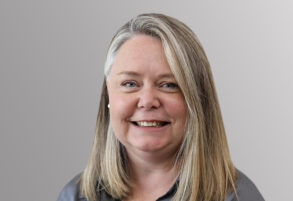
Traralgon Secondary School
From the Head of Traralgon Secondary School, Mrs Leonie Clark Education in the age of ‘Smart Machines’ I hope that our students, families and staff …
Traralgon Secondary School
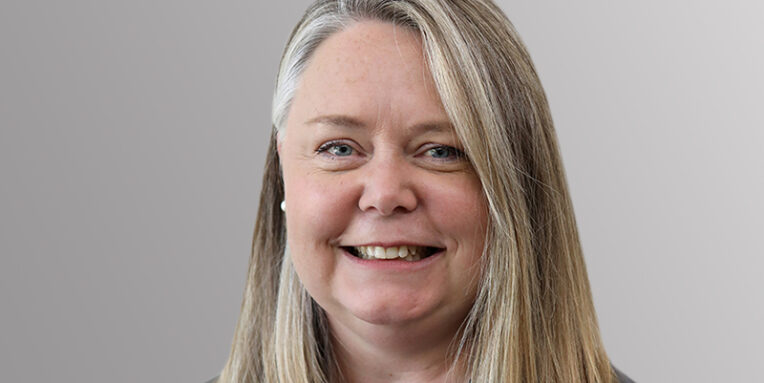
From the Head of Traralgon Secondary School,
Mrs Leonie Clark
Education in the age of ‘Smart Machines’
I hope that our students, families and staff enjoyed the sunshine during the Easter holidays while creating some wonderful memories.
During the second week of the holidays, I attended the AHISA (Associated Heads of Independent Schools Australia) Leading, Learning and Caring Conference, ‘Vision in Volatility’ in Sydney.
It was indeed a privilege to hear from leading Australian educators and academics as they discussed and presented their research in relation to issues and topics facing contemporary students and educators. In this and subsequent Grammarian articles, I would like to share some of the ideas and thinking presented for contemplation at the conference. This week I humbly present for your consideration some of my key takeaways and reflections from the opening Keynote address ‘Mass Personalisation and Entrepreneurial Thinking: Education in the Age of Smart Machines’ by Dr Yong Zhao, PhD Foundation Distinguished Professor School of Education and Human Sciences University of Kansas and Professor in Education Leadership Faculty of Education University of Melbourne.
Dr Zhao commenced his address by suggesting that to improve education for individual students in the future, we must continue to support and encourage students to focus on their unique skills and abilities. He stated that ” … every talent is valued when coupled with entrepreneurial skills’ and that this would be absolutely necessary in the future, to allow students to ‘develop to greatness’ in the age of smart machines.”
Zhao emphasised that “we really have not learned how to be good to each other”, and “that we have not taught people to share their skills and talents in a healthy co-dependence” to ultimately benefit humanity. He suggested that those students in the future who develop their individual gifts and talents, collaborate in a mutually beneficial codependence, and apply their abilities to identify problems that require solving, subsequently resolving those problems for the benefit of humanity; will be successful in the age of smart machines. Furthermore, Zhao acknowledged that the identification of problems “worth solving” is and will continue to be the most challenging step in the process, while acknowledging that we need to explicitly teach children “how to find the problems worth solving”, while asking them to consider “Why does it matter?” And further interrogating the problem at hand by asking our children and students, “Why do you think you can do it better and why now?”
As a team of parents and educators, we can promote and foster “problem identification” and “problem-solving moments” with our children in precious teachable moments of conversation and discussion. Asking our students and children to identify problems when reading the newspaper, or watching the evening news, while simultaneously encouraging children to think critically, to question everything (particularly in the online world), to be curious about ways in which they might make their community or world a better place, to read widely, to thoroughly interrogate topics and to ponder broadly while considering possible solutions to everyday and global problems. It is in all of the little moments of stretching our thinking together and exploring with our children that we will assist the next generation to develop critical interrogative thinking and the entrepreneurial problem-solving skills that Zhao indicated will be needed to reach “greatness” while advancing and preserving humanity in an age of smart machines.
New Staff Welcome
We are very pleased to welcome to our Traralgon Secondary School team Mr Joel Keenan, teacher of Science and Mathematics, and Miss Monique Hegarty, teacher of Technology subjects. We wish them well as they commence their professional journey with us at our Traralgon Secondary School and have no doubt that our families and students will make them feel very welcome as they settle into their new positions.
‘Morrisby Digital Career Exploration’ Year 10 Students
This week, our Year 10 students across both campuses will be sitting their Morrisby Assessments. Morrisby is a digital career exploration tool that involves initial profiling of each student to determine strengths, interests and values relating to current and future career options. It also provides significant career information that can be accessed across the student’s career journey to assist with decision-making and further career development and exploration. Upon completion, students will be able to access their results from 5:00 pm to read through with their family. Each Year 10 student will then be invited to a 20-minute one-on-one interview with the Head of Careers, who has completed specialist training in the Morrisby program, to assist with unpacking the report and clarifying any questions the student may have. Parents are more than welcome to attend these interviews. Interview times will be sent out to students early next week. The interviews will commence the week of 13 May.
Examination Preparation Years 9 /10 and VCE Unit 1 Students
The Year 9 and Year 10 examinations are scheduled for Week 9B Wednesday 12 June to Thursday 13 June, with a catch-up day scheduled for Friday 14 June. It is never too early to start preparing for examinations and it is important to note that our Secondary School teachers have been teaching content this year, that will be tested throughout the examination period.
Students are advised to use their time in the afternoon/evenings to revise content taught during the day, complete tasks for assessment, undertake pre-reading for upcoming content and revisit previously learned content by testing themselves at frequent and spaced intervals.
I have included below the suggested homework/revision times published in the front of the student diaries. Should your child need additional support with a particular topic or content, they are advised to seek advice from their subject teachers sooner rather than later. Please do not hesitate to reach out to your child’s Mentor or individual subject teacher/s should your child need additional strategies to support their study and revision at home.
Suggested Homework/Revision Times
Year 7 – 5 to 6 hours weekly
Year 8 – 6 to 7 hours weekly
Year 9 – 7 to 8 hours weekly
Year 10 – 10 to 15 hours weekly
Years 11 and 12 – 15+ hours, including school holidays
Digital Devices Health Check
As we head into the cooler months of the year when children spend more time indoors on devices, it is perhaps a good time to undertake a digital device health check. The eSafety commissioner website for parents and our very own St Paul’s/ySafe Safety Hub contain outstanding resources for parents and guardians to be able to manage and secure electronic devices. Unfortunately, pastoral concerns stemming from unsupervised mobile device use after hours, can from time to time, overflow into the school community and we encourage all families to visit the ySafe safety hub. Closely monitoring your child’s use of electronic devices and the setting of parental controls certainly avoids difficult conversations should things get a little out of hand. There is no doubt that it is a collective team effort to guide our children to use technology with care and respect for themselves and others. As always, your kind support is hugely appreciated to keep everyone in our community safe.
The education team at eSafety hosts webinars for parents and guardians each year. I have attached the Term 2 schedule below for your reference.
The Term 2, 2024 eSafety Commissioner Webinars include:
• eSafety 101: How eSafety can help (30 minutes) Suitable for parents and carers of children and young people in primary and secondary school.
• Wellbeing and digital technologies (30 minutes) Suitable for parents and carers of young people in secondary school.
• Consent and online boundaries: How to support your primary-aged child. (30 minutes) Suitable for parents and carers of children in primary school.
• Setting your child up for success online (30 minutes) Suitable for parents and carers of children in primary school.
To register for the above eSafety Term 2 webinars click here.
Open Day 2024
We invite all our current families to share with their friends and families the details of our upcoming Open Day at the Traralgon campus on Saturday 4 May from 10:00 am until 2:00 pm. This is a wonderful opportunity for families and community members to speak with our staff and tour the campus, including the new Futures Centre.
To register your attendance, please click here.
Child Safety In Our Carparks – A St Paul’s Team Focus
As the days become shorter in the coming months there is an increased need to be even more alert when travelling throughout our school grounds in vehicles. Please adhere to the 10 kilometres per hour speed limit and ensure that all children are directed to use the supervised pedestrian crossings. Too often we witness cars traversing far too quickly throughout the bottom of the horseshoe and over the pedestrian crossing. We are increasingly concerned about vehicles parking on the grass opposite the flagpoles while signalling to children to cross the road. Little ones are particularly hard to see from inside a vehicle and very unpredictable in moving traffic as they struggle to safely estimate the speed of passing vehicles. We certainly do not want to see an avoidable tragedy unfold at our campus; the care of our community is everyone’s responsibility. We respectfully request that parents/guardians park in designated parking areas only. Please do not park or drive on our lawns/evacuation site opposite the flag poles adjacent to the main driveway between our two sub schools.
Students Riding Bikes and Scooters
Just a reminder to all families that while we absolutely adore and warmly encourage our students to ride their bikes and scooters to and from school, they must always walk their bikes/scooters once inside our school grounds. It is far too dangerous to ride on the walkways and in between traffic during peak periods. Your kind support and reminders are greatly appreciated.
The Traralgon Secondary School Easter Egg Hunt
A huge ‘THANK YOU’ is extended to our brilliant FOSP team inspired by the outstanding leadership of our two Co-Presidents, Tanya Rong and Janelle Szkwarek. We thank them for their kind service to the school and generous support of the traditional Easter Egg Hunt post our whole campus Easter Service at the Traralgon Secondary School. We certainly saw some very excited children who found it a little difficult to contain their enthusiasm for the hunt this year!
Many thanks to the FOSP team for their work in preparing the Easter Egg Raffle, the Hot Cross Bun orders as well as the annual Easter Egg Hunt, a beloved ‘Traralgon Campus Tradition’. Congratulations to Harry Wight in Year 8 who cleverly located the elusive Golden Egg and won a fabulous basket full of prizes!
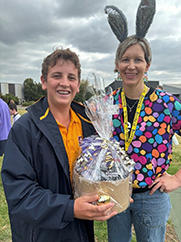
Harry Wight (Year 8) presented with a basket of Easter delights by Tanya Rong FOSP (Friends of St Paul’s Co-President).
Leonie Clark
Head of Traralgon Secondary School
WHAT’S ON
APRIL
24 March ANZAC Service
25 April ANZAC Day
MAY
4 May Open Day
9 May SEISA Music
10 May Kammer Konzert Rehearsal 2:00 pm
Kammer Konzert 7:00 pm
14 May SEISA Visual Arts
15 May Anniversary Service
16 May SEISA Junior Round 1
17 May Year 7 and Year 8 Disco
21 May Cultural Diversity and Dialogue Day
22 May National Simultaneous Storytime
23 May SEISA Junior Round 2
24 May Year 10 – P.A.R.T.Y Latrobe Regional Hospital Excursion
28 May Centrepiece
30 May SEISA Junior Round 3
JUNE
6 June SEISA Junior Round 4
10 June King’s Birthday Public Holiday
12 June Year 9 and Year 10 Examinations
13 June Year 9 and Year 10 Examinations
SEISA Junior Round 4
14 June Curriculum Day
17 June Semester 2 Commences
20 June Latrobe Valley Choir Big Sing 6:30 pm
25 June VCE Information Evening
28 June Last Day of Term 2 – Boho Friday, 2:10 pm Finish
PRAYER GROUP
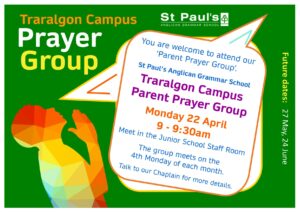
The Traralgon Parent Prayer Group starts up again on the 22 April. All parents are welcome to attend. We meet in the Junior School staff room at 9:00 am and are finished at 9:30 am. Sign in at the Junior School Office and they will point you in the right direction.
If you cannot make it but would like to send through some prayer requests, or you would just like some further information, then please contact the Chaplain, Glen Treble.
Glen Treble
Traralgon Chaplain
DOBSONS TRADING HOURS

Order online or click and collect: Please ensure that you only attend the store to collect your items once you have received notification that your order is ready, order here.
Negative News in the Media
The tragic events in Bondi over the weekend have been confronting for many children, adolescents and adults to watch and hear about. As parents, you may be wondering how to approach not only this event, but the constant stream of negative news portrayed in the media, with your children.
Limit exposure: As adults, we are often able to identify when we have reached our threshold of negative news for the day and know to engage in self-care at this stage. Children and adolescents may not have this insight and they may not fully understand all that they are seeing/hearing. As such, limiting their exposure to news media can be beneficial. It is generally advised that news media access be actively supervised and never used as background noise. If you are watching or listening to the news as a family and hear a warning about distressing content, or a warning that something may not be appropriate for younger audiences, change to something suitable for the whole family.
Have a discussion: Even if you avoid the news, children and adolescents are likely to hear about recent events from their peers. To avoid confusion or misunderstandings about events, it is important to be proactive. If possible, prepare for any discussions and make sure that these occur at a time when you feel calm and regulated. Remember that children and adolescents often watch their parents for cues about how they should feel about situations. Ask your child what they have heard about recent events and correct any misinformation. Deliver age-appropriate information in a clear and honest manner. Sometimes programs like Behind the News can provide age-appropriate information to use as a springboard for further discussion. Remind your child that they can come to you with any questions they may have.
Ask your child how they are feeling: Seeing violent events on a screen can be as traumatic as witnessing them in real life, particularly for children and adolescents. It is important that you check in with your child about how they are feeling about recent events. Avoid statements that dismiss their feelings, and instead validate and normalise these. Offer appropriate reassurance, perhaps by reminding your child that such events are rare, that professionals/experts are managing the situation, or by providing context that helps them to understand that they are not at risk.
Watch out for signs of distress: Children and adolescents may not be able to verbally articulate if they are feeling distressed by what they have seen or heard in the media. It is important to maintain open communication with your child, as well as to watch for changes in their behaviour. Behavioural changes may include an increase in nightmares, sudden sleep reluctance, appetite changes, separation anxiety, withdrawal, emotional dysregulation or feeling unwell.
Maintain routines: Routines provide a sense of safety and security to children and adolescents. Keeping your family routine as consistent as possible is likely to be helpful during distressing times. Increasing connection and engaging with friends and family can also be beneficial.
Seek support: If your child seems distressed by something they have seen or heard, reach out for support. The St Paul’s Anglican Grammar School Counselling team is available to provide support to students in need. To arrange a session, speak to your child’s classroom teacher, Head of Year, or Deputy Head of School. Remember that services like Kids Help Line (1800 55 1800), Lifeline (13 11 14), Beyond Blue (1300 224 636) and Headspace (1800 650 890) are available to provide telephone and online support outside of school hours.
Shannon Staples
Head of Counselling Services
Senior Student Trip to East Timor – Ponilala
A recent senior student trip to the Ermera District of East Timor provided a glimpse into the life and traditions of the Timorese people, leaving a lasting impression of friendship and cultural richness. “The people I’ve made friends with, the Timorese and Aussies [fellow participants], will always be treasured.” (Asmi)
From the moment our group arrived, we were greeted with open arms by the friendly Timorese locals, “[they] remind you what it means to be grateful and happy” (India). Their warm smiles and genuine curiosity about our journey made us feel instantly welcomed and at home.
One of the highlights of our trip was our visit to Ponilala Secondary School (partly funded by St Paul’s in 2007). Ponilala is situated in the hills of Ermera, overlooking the large town of Gleno and its isolation excludes it from regular visitors. After a traditional welcome with open arms and warm hearts, we stepped into the Ponilala secondary classroom, a room in stark contrast to what our students were expecting; we were greeted with a sea of smiling eager students squeezed into old wooden desks, a chalkboard and sadly, a lack of resources.
The day kicked off with vibrant displays of traditional Timorese dancing and singing, showcasing the rich heritage and artistic talent of the community. In the spirit of cultural exchange and in somewhat of a contrast, our students reciprocated by sharing the familiar dance moves of Timber and the iconic Nutbush dance. The laughter and shared moments on the dance floor brought us together and created memories that will last a lifetime.
The delivery of the English/Tetun dictionaries kindly donated by so many generous St Paul’s families was met with overwhelming appreciation as you can see in the students’ faces! This simple act will have a profound impact on their English learning journey and was truly appreciated by the teaching staff as well, who were quick to ask for their own copies too.
Another special moment was the gifting of a beautiful guitar in a brand-new case, a pre-trip call-out responded to by a parent and our Performing Arts faculty. It brought so much joy not only to the very talented music teacher at Ponilala but also to the students and staff. In true Timorese fashion, the best way to show appreciation was to celebrate with a traditional and beautiful song.
Amidst the festivities, a Timorese luncheon was laid out to honour our visit and to show appreciation for the ongoing support and friendship extended by St Paul’s. This delicious gesture of gratitude and hospitality came with an apology they had nothing else to gift us in return for years of connection. However, being able to help and support such a warm, inclusive and resilient community is more valuable than any tangible gift.
As the day progressed, the senior Ponilala students showcased their creativity and scientific knowledge through experiments using basic items like old bottles, tin cans, candles and steel wool, to name a few. From homemade models, they demonstrated an understanding of scientific concepts, serving as a reminder of the power of education and the potential that lies within every young mind, regardless of their circumstances.
As our day at Ponilala drew to a close, our hearts were full and bonds were strengthened. As a group, we learned much about resilience, gratitude and the importance of friendship and connections, and how much our support means. “Getting to know children at the schools we have supported has allowed me to put into perspective the reason we fundraise for these communities” (Ella).

Ella giving out the much-appreciated gift of a dictionary.

Senior students proudly showing us their science experiments using basic items.

Bella Sellers, Sophia Hastie, Asmi Pathania, Chloe Davidson, Sienna Smith, Alice den Houting, India Van Berkel, Ella May.

The gift of a guitar means so much to this community.

Our students connecting some of the Ponilala locals.

A traditional warm welcome.

A traditional dance performance.
Teachers: Kirsten Enders, Andrea Heard, Jan Park.
Students: Ella May, Asmi Pathania and India Van Berkel
Registrations for ICAS Competitions 2024 Now Open
We are delighted to inform you that St Paul’s Anglican Grammar School – Traralgon Secondary School will again be participating in the world-renowned ICAS Assessments™ this year. ICAS is designed to target students’ higher order thinking and problem-solving skills. In the coming days, you will receive a letter with further information by email.
ICAS Assessments are now online, a move that reflects a sector-wide transition to online assessments. This allows greater accessibility for students and faster delivery of results.
Learn more about ICAS here.
Our campus has signed up for the ICAS Assessments parent payment system (PPS) for Mathematics, English, Science, Spelling Bee, Writing, and Digital Technologies. Tests are available to students in Years 7 to 10, with the exception of Spelling Bee and Digital Technologies, which are only available to Year 7 students. Through this system, parents can pay for ICAS directly online while tests will still be held at our school. Please use the following details to register your child no later than Friday 19 July. Also, complete and return the permission slip that will accompany the invitation letter you will receive shortly.

Thank you for your ongoing support of ICAS Competitions at St Paul’s.
Donna Byrne
Director of Learning and Teaching – Traralgon Secondary School
SEISA Badminton
On 22 March and after many training sessions, our Badminton team competed in the annual SEISA Badminton tournament. With each player ready and raring to go, the day was very successful as all players showed great sportsmanship both on and off the court.
Overall St Paul’s Traralgon finished fourth.
Highlights of the day also included:
- Our intermediate girls finishing second.
- Our senior girls placing third in an older division.
- Our junior boys being super competitive in every match.
- The overall effort and improvement in our skills.
Lastly, I hope next year we can continue our momentum and grow as a team.
Ben Zanella
Badminton Coach
TRARALGON CAMPUS ENSEMBLE REHEARSAL SCHEDULE
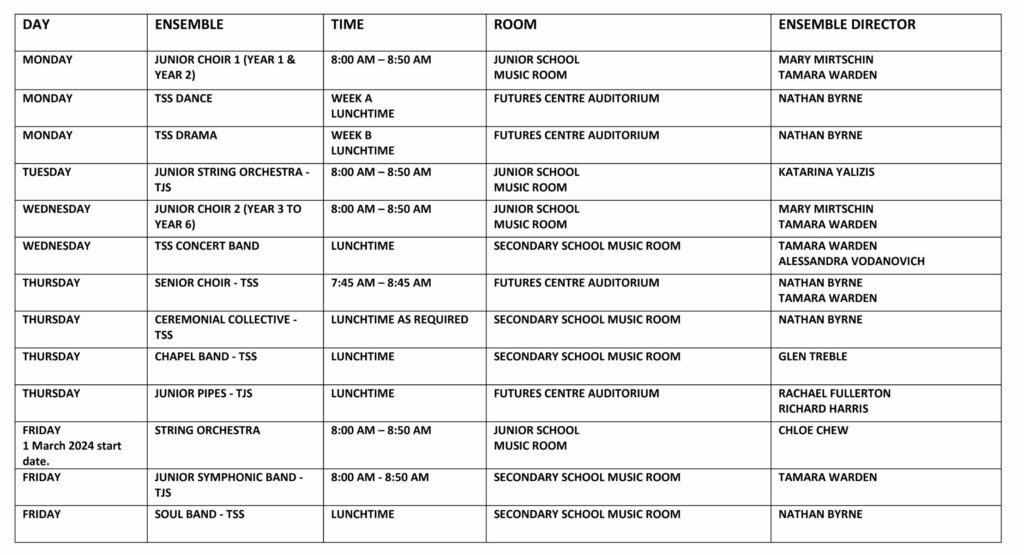 New members, including students receiving tuition outside of school, are most welcome. Please contact Mrs Heather Mason, and/or the listed ensemble director for further information hjmason@stpaulsags.vic.edu.au .
New members, including students receiving tuition outside of school, are most welcome. Please contact Mrs Heather Mason, and/or the listed ensemble director for further information hjmason@stpaulsags.vic.edu.au .
Heather Mason
Head of Performing Arts – Co-Curricular

ALUMNI REUNIONS

Saturday 4 May 2024
Year 9 Centre, St Paul’s Anglican Grammar School, 150 Bowen Street Warragul
• Class of 2019 – 5 Year Reunion
• Class of 2014 – 10 Year Reunion
• Class of 2004 – 20 Year Reunion
This year we have brought forward the timing of our Alumni Reunions to coincide with the school’s annual Open Day. Moving the reunions earlier provides us with a wonderful opportunity to celebrate and tour the school in action, see how it has changed and meet some of the current St Paul’s students and staff. Please join us at any stage between 10:00 am and 2:00 pm, chat with our Alumni representatives and reminisce over the range of memorabilia on display. You might also like to join the Alumni school tour which will take place at 12:30 pm, before continuing your celebrations with some drinks, nibbles and catch-ups at Bandolier Brewing, 28 Mason Street Warragul, from 2:00 pm to 5:00 pm.
Please RSVP by completing the registration here.
Michelle Ireland
Community Coordinator
alumni@stpaulsags.vic.edu.au
FROM THE FINANCE OFFICE
Private Car Conveyance Allowance
Families driving students more than 4.8 kilometres to attend St Paul’s Anglican Grammar School may be eligible to receive a conveyance allowance. For further information on the eligibility criteria and application process, please refer to https://www2.education.vic.gov.au/pal/conveyance-allowance/policy
Eligible families applying for the car conveyance allowance will have funds credited to their fee account during the year. If the fee account has been paid in full, or is on a direct debit arrangement, any allocation will show as a credit on the following year’s invoice.
The Camps, Sports and Excursions Fund (CSEF)
The Camps, Sports and Excursions Fund (CSEF) provides payments directly to the school for the benefit of the eligible student to attend camps, sports and excursions. Families holding a valid means-tested concession card or temporary foster parents are eligible to apply. $125 per year will be paid for eligible primary school students and $225 per year paid for eligible secondary school students. Payments will go directly to the school and be tied to the student. For more information and to download the application form please go to https://www2.education.vic.gov.au/pal/camps-sports-and-excursions-fund/resources
Parents are encouraged to lodge the application form immediately. The CSEF program for 2024 closes at the end of Term 2. All forms must be received by 24 June 2024 to be processed.
For parents who received CSEF at the school in 2023 (and the student/s are still enrolled in 2024), the schools will ‘copy’ the application across from 2023 to 2024 on the CSEF system. The CSEF system will automatically validate the parent’s eligibility with Centrelink.
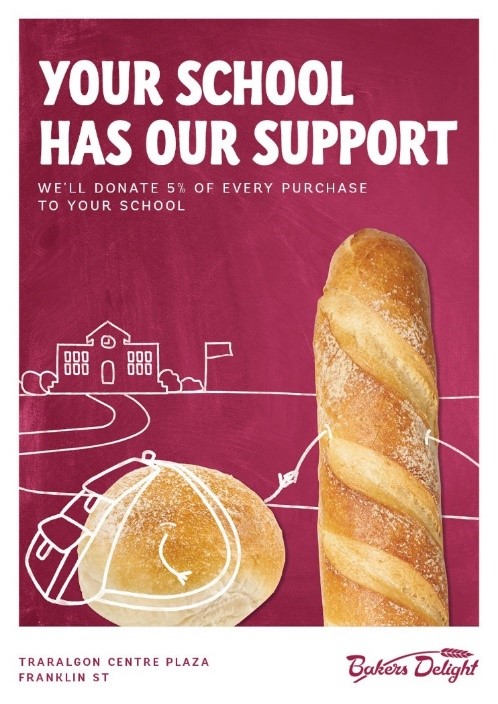
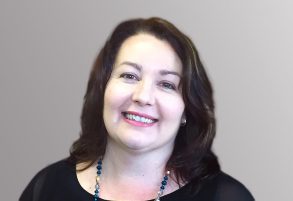
Traralgon Junior School
From the Head of Traralgon Junior School, Ms Tracey King. Welcome to Term 2! Welcome back to another exciting term in our Junior School. We …
Traralgon Junior School
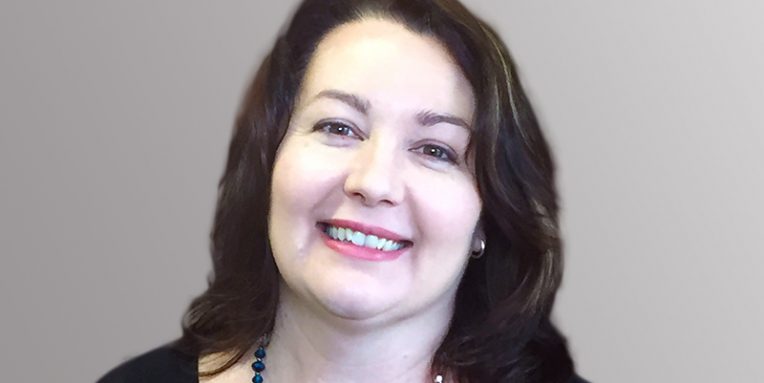
From the Head of Traralgon Junior School,
Ms Tracey King.
Welcome to Term 2!
Welcome back to another exciting term in our Junior School. We are thrilled to welcome our students and families back to campus for Term 2. After a well-deserved break, it is time to dive back into the rhythm of learning, growth and discovery. It is a time for setting goals, exploring new subjects and embracing fresh challenges.
Students are encouraged to approach the new term with curiosity, enthusiasm and a willingness to learn. Our students can look forward to a wide range of exciting opportunities both inside and outside the classroom. From engaging lessons and creative projects to co-curricular activities and special events, there is something for everyone to enjoy and explore.
At St Paul’s we believe in the power of community. Together, we create a supportive and inclusive environment where every student feels valued, respected and empowered to succeed. As we navigate the ups and downs of the term ahead, let’s remember to support and encourage each other.
Communication is key to a successful partnership between home and school. We encourage parents and guardians to stay connected with us throughout the term. Whether it is through our school newsletter, MyStPauls portal posts, parent-teacher conferences, or informal conversations, we value your input and involvement in your child’s education. Parents are encouraged to contact classroom teachers with any concerns or questions as needed.
As we embark on this new term together, I want to extend my warmest wishes to each and every one of you. May this term be filled with joy, growth and countless opportunities for learning and achievement. Welcome back, students and families! Let’s make Term 2 a memorable and successful chapter in our academic journey.
Behaviour Education
In our Junior School, we are focused on the journey of raising well-rounded individuals. Whilst schools often focus on academics, co-curricular activities and social development, one aspect that sometimes gets overlooked is behaviour education curriculum. This curriculum plays a pivotal role in shaping the character, values and social skills of children.
Behaviour education curriculum encompasses a range of topics aimed at fostering positive behaviours, attitudes and social interactions in children. It goes beyond teaching subjects like Mathematics or Science; instead, it focuses on nurturing qualities like empathy, responsibility, self-control and resilience. At Traralgon Junior School through our Play Is The Way program, structured lessons, discussions and activities, children learn to navigate social situations, manage their emotions and make ethical decisions.
Behaviour Education includes:
- Building Essential Life Skills
One of the key benefits of behaviour education curriculum is its focus on imparting essential life skills. In today’s fast-paced world, academic achievements alone are not enough to ensure success. Employers increasingly value soft skills such as teamwork, communication, problem-solving and adaptability. By integrating these skills into the curriculum, children are being prepared for the challenges they will face in their personal and professional lives.
- Fostering Empathy and Compassion
In a society that often emphasises individualism, cultivating empathy and compassion in children is more important than ever. Behaviour education curriculum teaches children to consider the perspectives and feelings of others, leading to more inclusive and harmonious communities. When children learn to empathise with others, they are less likely to engage in bullying, discrimination or antisocial behaviour.
- Promoting Ethical Decision-Making
Ethical decision-making is a cornerstone of responsible citizenship. Behaviour education curriculum helps children develop a strong moral compass by exploring ethical dilemmas, discussing values and reflecting on their actions. By encouraging critical thinking and introspection, students are empowered to make principled decisions even in challenging situations.
- Nurturing Resilience and Emotional Wellbeing
Life is full of ups and downs, and resilience is the ability to bounce back from setbacks and adversity. Behaviour education curriculum teaches children coping strategies, stress management techniques and positive thinking habits that promote resilience and emotional wellbeing. By equipping children with these skills, parents prepare them to face life’s challenges with confidence and optimism.
- Strengthening Family and Community Bonds
Behaviour education curriculum not only benefits individual children but also strengthens family and community bonds. By involving parents, teachers and community members in discussions and activities, parents create a support network that reinforces positive values, behaviours and morals. When families and communities work together to instil these values, children receive consistent messages about what it means to be respectful, responsible and compassionate members of society.
- Play is the Way Life Rafts
The life rafts provide a structure and guide for teachers and students to talk about behaviour and expectations.
These include:
1. Treat others as you would like to be treated – if someone is unlike you seek to understand them.
2. Pursue your personal best no matter who you work with – we do not come to school to be better than others – we come to school to better ourselves by being able to work with others.
3. It takes great strength to be sensible – we do the right thing because it is the best thing to do.
4. Have reasons for the things you say and do – if you do not know why you are doing something then do not do it because it is most likely wrong.
5. Be Brave – participate to progress – school is about stepping bravely into the unknown. The unknown is often uncomfortable. The braver you are the more you learn.
6. Be the master not the victim of your feelings
- Am I doing the right thing or the wrong thing?
- Am I making a strong decision or a weak decision?
- Are my feelings in charge of my actions or is my thinking in charge?
- Am I running away from the problem or am I dealing with it?
- Am I being my own boss or am I inviting an adult to be my boss?
- Is my teacher trying to help or hurt me?
Behaviour education curriculum is a vital component of raising socially responsible and emotionally intelligent children. By prioritising behaviour education alongside academics and co-curricular activities, our school is laying the foundation for student success and wellbeing in all aspects of life. Our teachers have high expectations regarding the behaviour of students in classrooms and in the playground and respond promptly to concerning behaviour to assist students to learn and grow. Consistent processes, expectations and use of language across the school is greatly beneficial for students as they work towards developing these behaviours and understandings. In a world that values integrity, empathy and resilience, behaviour education curriculum equips children with the tools they need to thrive as individuals and contribute positively to their communities.
We are excited to welcome Wilson and Julie McCaskill, creators of Play is the Way, back to our Traralgon Junior School in Week 4 for further professional development with our teaching team.
ANZAC DAY
ANZAC Day on 25 April is a significant date in our annual calendar. This is the anniversary of the day when Australian and New Zealand soldiers landed on Gallipoli in 1915 as part of the Allies’ invasion. ANZAC Day draws large crowds of people to the dawn services, and marches are held around the country. ANZAC Day is a time for all Australians to recognise the more than 1.5 million service personnel who served our country in conflicts, wars and peacekeeping operations. It is also a time to remember the over 103,000 Australians who sacrificed their lives in our country’s name.
ANZAC Day is a time for us to honour the courage and sacrifice of the brave men and women who served and continue to serve our country. It is an opportunity for us to come together as a community to reflect, pay our respects and teach our children about the importance of remembrance. This year we will acknowledge ANZAC Day on Wednesday 24 April with a special service at 10:30 am and parents are most welcome to join us. We encourage families to commemorate ANZAC Day in their own meaningful way, whether it is attending a local dawn service, participating in a moment of silence, or sharing stories of bravery and resilience with our children. Lest we forget.
Nude Food
Young people are becoming the champions of a more sustainable future as they realise that this future is their own. Our Junior School students are no exception and we have a passionate ‘Green Team’ who are keen to see our campus focus on sustainability practices. The team hopes that their small daily actions will contribute to a big and positive environmental change.
An initiative they are particularly passionate about is ‘Nude Food’. In our Junior School, we are encouraging students to keep their lunchboxes waste-free and containing food that is not wrapped in foil, plastic or commercial packaging.
Why nude food?
In the United States, the New York State Department of Environmental Conservation estimated that the average child taking a disposable lunch to school generates 30 kilograms of garbage per school year. With our busy lives and the convenience of pre-packaged lunch items and single-use wrappings like cling wrap, we are sure the statistics would be similar at home in Australia. A lot of this waste will end up in landfills. Our students are passionate about decreasing the amount of waste we as a school send to landfill and would also like to see less rubbish on our school grounds.
So how can you support your child and their care for creating a better world?
Preparation is key! With the right amount of foresight and organisation, the art of putting together your student’s nude food lunchbox will become a breeze.
This starts with getting the right lunchbox and containers. All-in-one lunchboxes with compartments are ideal or a couple of smaller containers held inside a lunchbox work well. We recommend having a solid collection of reusable containers.
Beeswax wraps and lunchskins are another environmentally conscious storage means that produce far less waste than single-use cling wrap.
Next up, it is time to ditch packaged food. Food wrapped in plastic is often heavily processed and low in nutrition. Instead, some easy alternatives could include homemade popcorn or cut-up fresh fruit. We recommend buying in bulk. Instead of plastic-wrapped cheese sticks, buy a large block of cheese and cut it into sticks or cubes, or instead of purchasing yoghurt squeezes opt for a large tub of plain yogurt that can be portioned into small containers.
For those time-poor among us, this is a fantastic way to give your student autonomy over their lunchbox. Allowing them to pack their nude food lunchboxes is a rewarding experience of independence and also leaves you less pressed for time.
While the overall goal from us as a school community is to reduce campus waste, we hope you see the value in teaching your student that small changes in their daily life can have huge impacts on their environmental and personal health.
URGENT – Child Safety in the Carpark – A ‘Priority’
As the days become shorter in the coming months there is an increased need to be even more alert when travelling throughout our school grounds in vehicles. Please adhere to the 10 kilometres per hour speed limit and ensure that all children are directed to use the supervised pedestrian crossings. Too often we witness cars traversing far too quickly throughout the bottom of the horseshoe and over the pedestrian crossing and through the Junior School carpark. We are increasingly concerned about parents and guardians parking on the grass opposite the flagpoles while signalling to children to cross the road. Little ones are particularly hard to see from a vehicle and very unpredictable in moving traffic as they struggle to safely estimate the speed of passing vehicles. We certainly do not want to see an avoidable tragedy unfold at our campus; the care of our community is everyone’s responsibility. We respectfully request that parents/guardians park in designated parking areas only. Please do not park or drive on our lawns/evacuation site opposite the flag poles adjacent to the main driveway between our two sub-schools. Students have been instructed to always use the school pedestrian crossings and not to cross the school driveway to get to their parents’ cars. Parent support to keep our little people safe is very much appreciated.
School TV report: Diet & Nutrition | St Paul’s Anglican Grammar School
Families today, with school-age children, have very busy schedules. This can sometimes make it hard to sit down to homemade meals every day when there is such an abundance of pre-packaged and processed food available. However, it is still important to teach your kids healthy eating habits. Diet and nutrition is crucial to your child’s development. Not only can it prevent many chronic diseases, but it also impacts on your child’s brain development and learning abilities.
There are many benefits to incorporating a healthy diet and good nutrition. It can stabilise your child’s energy, improve their mood and maintain a healthy weight. Not only will it improve their general wellbeing, but it can also have a positive impact on their mental health helping prevent anxiety, depression and ADHD.
Tracey King
Head of Traralgon Junior School
WHAT’S ON
APRIL
23 April Cross Country Carnival
24 April ANZAC Day Service 10:30 am
Regional Tennis competition
25 April ANZAC Day Public Holiday
30 April District Cross Country
MAY
1 May Years 3 and 4 Camp CYC The Island
Buddy Picnic
2 May Year 3 and 4 Camp CYC The Island
3 May Year 3 and 4 Camp CYC The Island
9 May Mother’s Evening Event 5:30 pm
10 May FOSP Mother’s Day Stall
Traralgon Secondary School Market Day for Years 3 to 6
State Individual Tennis
15 May Division Cross Country
16 May Education Support Staff Day
22 May National Simultaneous Storytime
Studio Concert
27 May Reconciliation Week
JUNE
4 June District Winter Sports
5 June World Environment Day
6 June Regional Cross Country
10 June King’s Birthday Public Holiday
12 June Buddy Picnic
14 June Student Free Day
18 June Classroom EXPOs 2:30 pm
20 June Division Winter Sports
Endeavour Showcase 2:30 pm
27 June Aladdin JR Musical 6:00 pm
28 June Boho Friday
End of Term dismissal 2:20 pm
CLASS UPDATES
Year 1
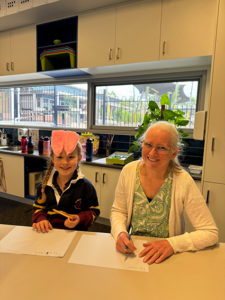
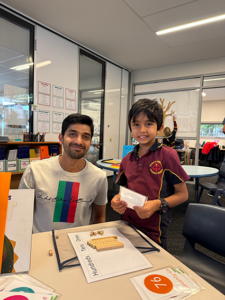
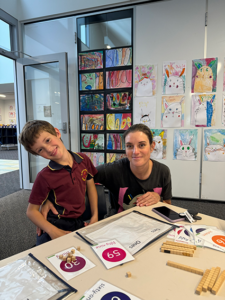
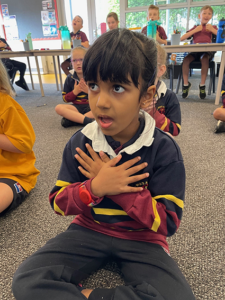
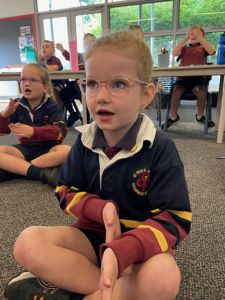
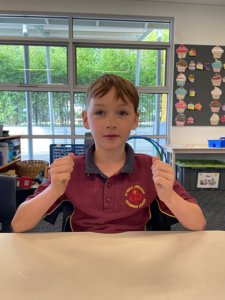
Year 2
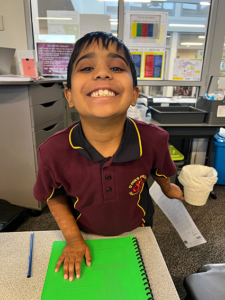
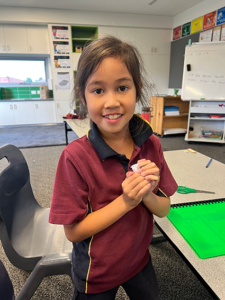
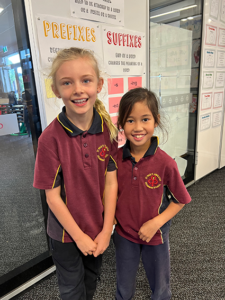
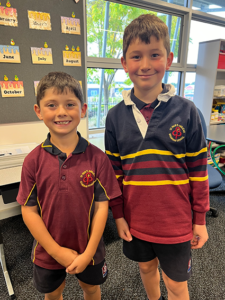
Year 3
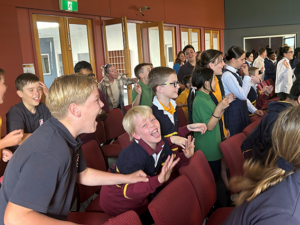
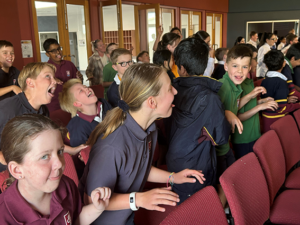
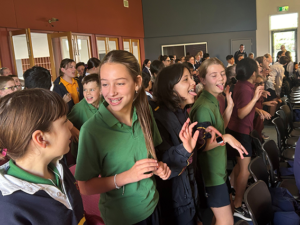
Year 4
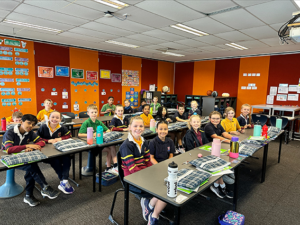

Year 5
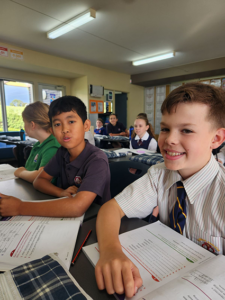
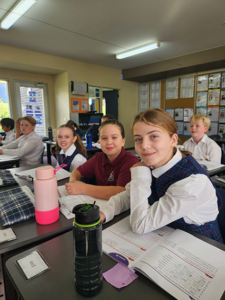
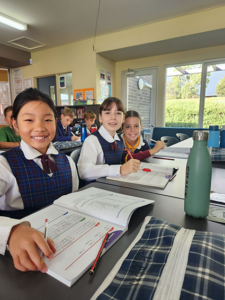
PRAYER GROUP
The Traralgon Parent Prayer Group starts up again on 22 April. All parents are welcome to attend. We meet in the Junior School staff room at 9:00 am and are finished at 9:30 am. Sign in at the Junior School Office and they will point you in the right direction.
If you cannot make it but would like to send through some prayer requests, or you would just like some further information, then please contact the Chaplain, Glen Treble.
Glen Treble
Traralgon Chaplain
DOBSONS TRADING HOURS

Order online or click and collect: Please ensure that you only attend the store to collect your items once you have received notification that your order is ready, order here.
Negative News in the Media
The tragic events in Bondi over the weekend have been confronting for many children, adolescents and adults to watch and hear about. As parents, you may be wondering how to approach not only this event, but the constant stream of negative news portrayed in the media, with your children.
Limit exposure: As adults, we are often able to identify when we have reached our threshold of negative news for the day and know to engage in self-care at this stage. Children and adolescents may not have this insight and they may not fully understand all that they are seeing/hearing. As such, limiting their exposure to news media can be beneficial. It is generally advised that news media access be actively supervised and never used as background noise. If you are watching or listening to the news as a family and hear a warning about distressing content, or a warning that something may not be appropriate for younger audiences, change to something suitable for the whole family.
Have a discussion: Even if you avoid the news, children and adolescents are likely to hear about recent events from their peers. To avoid confusion or misunderstandings about events, it is important to be proactive. If possible, prepare for any discussions and make sure that these occur at a time when you feel calm and regulated. Remember that children and adolescents often watch their parents for cues about how they should feel about situations. Ask your child what they have heard about recent events and correct any misinformation. Deliver age-appropriate information in a clear and honest manner. Sometimes programs like Behind the News can provide age-appropriate information to use as a springboard for further discussion. Remind your child that they can come to you with any questions they may have.
Ask your child how they are feeling: Seeing violent events on a screen can be as traumatic as witnessing them in real life, particularly for children and adolescents. It is important that you check in with your child about how they are feeling about recent events. Avoid statements that dismiss their feelings, and instead validate and normalise these. Offer appropriate reassurance, perhaps by reminding your child that such events are rare, that professionals/experts are managing the situation, or by providing context that helps them to understand that they are not at risk.
Watch out for signs of distress: Children and adolescents may not be able to verbally articulate if they are feeling distressed by what they have seen or heard in the media. It is important to maintain open communication with your child, as well as to watch for changes in their behaviour. Behavioural changes may include an increase in nightmares, sudden sleep reluctance, appetite changes, separation anxiety, withdrawal, emotional dysregulation or feeling unwell.
Maintain routines: Routines provide a sense of safety and security to children and adolescents. Keeping your family routine as consistent as possible is likely to be helpful during distressing times. Increasing connection and engaging with friends and family can also be beneficial.
Seek support: If your child seems distressed by something they have seen or heard, reach out for support. The St Paul’s Anglican Grammar School Counselling team is available to provide support to students in need. To arrange a session, speak to your child’s classroom teacher, Head of Year, or Deputy Head of School. Remember that services like Kids Help Line (1800 55 1800), Lifeline (13 11 14), Beyond Blue (1300 224 636) and Headspace (1800 650 890) are available to provide telephone and online support outside of school hours.
Shannon Staples
Head of Counselling Services
Senior Student Trip to East Timor – Ponilala
A recent senior student trip to the Ermera District of East Timor provided a glimpse into the life and traditions of the Timorese people, leaving a lasting impression of friendship and cultural richness. “The people I’ve made friends with, the Timorese and Aussies [fellow participants], will always be treasured.” (Asmi)
From the moment our group arrived, we were greeted with open arms by the friendly Timorese locals, “[they] remind you what it means to be grateful and happy” (India). Their warm smiles and genuine curiosity about our journey made us feel instantly welcomed and at home.
One of the highlights of our trip was our visit to Ponilala Secondary School (partly funded by St Paul’s in 2007). Ponilala is situated in the hills of Ermera, overlooking the large town of Gleno and its isolation excludes it from regular visitors. After a traditional welcome with open arms and warm hearts, we stepped into the Ponilala secondary classroom, a room in stark contrast to what our students were expecting; we were greeted with a sea of smiling eager students squeezed into old wooden desks, a chalkboard and sadly, a lack of resources.
The day kicked off with vibrant displays of traditional Timorese dancing and singing, showcasing the rich heritage and artistic talent of the community. In the spirit of cultural exchange and in somewhat of a contrast, our students reciprocated by sharing the familiar dance moves of Timber and the iconic Nutbush dance. The laughter and shared moments on the dance floor brought us together and created memories that will last a lifetime.
The delivery of the English/Tetun dictionaries kindly donated by so many generous St Paul’s families was met with overwhelming appreciation as you can see in the students’ faces! This simple act will have a profound impact on their English learning journey and was truly appreciated by the teaching staff as well, who were quick to ask for their own copies too.
Another special moment was the gifting of a beautiful guitar in a brand-new case, a pre-trip call-out responded to by a parent and our Performing Arts faculty. It brought so much joy not only to the very talented music teacher at Ponilala but also to the students and staff. In true Timorese fashion, the best way to show appreciation was to celebrate with a traditional and beautiful song.
Amidst the festivities, a Timorese luncheon was laid out to honour our visit and to show appreciation for the ongoing support and friendship extended by St Paul’s. This delicious gesture of gratitude and hospitality came with an apology they had nothing else to gift us in return for years of connection. However, being able to help and support such a warm, inclusive and resilient community is more valuable than any tangible gift.
As the day progressed, the senior Ponilala students showcased their creativity and scientific knowledge through experiments using basic items like old bottles, tin cans, candles and steel wool, to name a few. From homemade models, they demonstrated an understanding of scientific concepts, serving as a reminder of the power of education and the potential that lies within every young mind, regardless of their circumstances.
As our day at Ponilala drew to a close, our hearts were full and bonds were strengthened. As a group, we learned much about resilience, gratitude and the importance of friendship and connections, and how much our support means. “Getting to know children at the schools we have supported has allowed me to put into perspective the reason we fundraise for these communities.” (Ella).

A traditional dance performance.

The gift of a guitar means so much to this community.

Senior students proudly showing us their science experiments using basic items.

Bella Sellers, Sophia Hastie, Asmi Pathania, Chloe Davidson, Sienna Smith, Alice den Houting, India Van Berkel, Ella May.

Ella giving out the much-appreciated gift of a dictionary.

A traditional warm welcome.

Our students connecting some of the Ponilala locals.
Teachers: Kirsten Enders, Andrea Heard, Jan Park.
Students: Ella May, Asmi Pathania and India Van Berkel
TRARALGON CAMPUS ENSEMBLE REHEARSAL SCHEDULE
 New members, including students receiving tuition outside of school, are most welcome. Please contact Mrs Heather Mason, and/or the listed ensemble director for further information hjmason@stpaulsags.vic.edu.au .
New members, including students receiving tuition outside of school, are most welcome. Please contact Mrs Heather Mason, and/or the listed ensemble director for further information hjmason@stpaulsags.vic.edu.au .
Heather Mason
Head of Performing Arts – Co-Curricular

ALUMNI REUNIONS

Saturday 4 May 2024
Year 9 Centre, St Paul’s Anglican Grammar School, 150 Bowen Street Warragul
• Class of 2019 – 5 Year Reunion
• Class of 2014 – 10 Year Reunion
• Class of 2004 – 20 Year Reunion
This year we have brought forward the timing of our Alumni Reunions to coincide with the school’s annual Open Day. Moving the reunions earlier provides us with a wonderful opportunity to celebrate and tour the school in action, see how it has changed and meet some of the current St Paul’s students and staff. Please join us at any stage between 10:00 am and 2:00 pm, chat with our Alumni representatives and reminisce over the range of memorabilia on display. You might also like to join the Alumni school tour which will take place at 12:30 pm, before continuing your celebrations with some drinks, nibbles and catch-ups at Bandolier Brewing, 28 Mason Street Warragul, from 2:00 pm to 5:00 pm.
Please RSVP by completing the registration here.
Michelle Ireland
Community Coordinator
alumni@stpaulsags.vic.edu.au
FROM THE FINANCE OFFICE
Private Car Conveyance Allowance
Families driving students more than 4.8 kilometres to attend St Paul’s Anglican Grammar School may be eligible to receive a conveyance allowance. For further information on the eligibility criteria and application process, please refer to https://www2.education.vic.gov.au/pal/conveyance-allowance/policy
Eligible families applying for the car conveyance allowance will have funds credited to their fee account during the year. If the fee account has been paid in full, or is on a direct debit arrangement, any allocation will show as a credit on the following year’s invoice.
The Camps, Sports and Excursions Fund (CSEF)
The Camps, Sports and Excursions Fund (CSEF) provides payments directly to the school for the benefit of the eligible student to attend camps, sports and excursions. Families holding a valid means-tested concession card or temporary foster parents are eligible to apply. $125 per year will be paid for eligible primary school students and $225 per year paid for eligible secondary school students. Payments will go directly to the school and be tied to the student. For more information and to download the application form please go to https://www2.education.vic.gov.au/pal/camps-sports-and-excursions-fund/resources
Parents are encouraged to lodge the application form immediately. The CSEF program for 2024 closes at the end of Term 2. All forms must be received by 24 June 2024 to be processed.
For parents who received CSEF at the school in 2023 (and the student/s are still enrolled in 2024), the schools will ‘copy’ the application across from 2023 to 2024 on the CSEF system. The CSEF system will automatically validate the parent’s eligibility with Centrelink.


From the Chaplain
Dressed For Success Amid a world filled with unsettling news events, it is natural to feel overwhelmed, anxious, or even despondent. Whether it is the …
From the Chaplain

Dressed For Success
Amid a world filled with unsettling news events, it is natural to feel overwhelmed, anxious, or even despondent. Whether it is the latest global crisis, personal challenges, or societal issues, the weight of bad news can sometimes feel unbearable. The material circulating online, predominantly on social media, following last weekend’s stabbings has highlighted a particular concern for young people being confronted with violent and disturbing news. How do we equip them to cope with the grimmer realities of the world? There are certainly some unhelpful ways to respond to these moments that I often observe in myself and others.
One of these is the denial response. We refuse to engage with whatever the bad news is and instead distract ourselves with music, work, social media, gaming, Netflix or anything that stops us from thinking about the bad stuff. The trouble with denial is that the bad stuff doesn’t go away – we just avoid dealing with it. Removing yourself from unhelpful negative reporting is certainly a good idea, as is giving yourself a break from the constant bombardment of news, but at some point, we have to confront the fact that not everything in the world is good.
The opposite of this approach is to wallow in bad news. Instead of avoiding it, we almost revel in it, digging into every horrible detail we can find until we become paralysed and overwhelmed by hopelessness. There is even a name for it – it is called ‘doom-scrolling’, and I have certainly fallen victim to it at times.
But what if there was a different way to respond?
Enter Christian lament – a concept often overlooked but deeply profound in its implications. Lament, far from being a mere expression of grief or complaint, offers us a pathway to navigate through the storms of life with a sense of purpose and assurance. It is a practice deeply rooted in the ancient wisdom of the Psalms, where two-thirds of the collection is dedicated to lament.
At its core, lament is an expression of grief and sadness, often accompanied by a sense of righteous anger at the injustices of the world. It is a raw, honest response to the brokenness that surrounds us – a recognition that some things are fundamentally wrong and demand to be acknowledged. But lament is more than just a lamentation of the present; it is also a declaration of hope for the future. Even amid our darkest moments, we cling to the promise that God is at work, bringing about redemption and restoration.
There has been much written about the process of lament but here I want to suggest four things that I think lament does that can help all of us, including young people, deal with the bad news that so often surrounds us:
- External Expression of Feelings: Lament provides us with a safe space to express our emotions externally. Instead of bottling up our feelings or turning them inward, God invites us to share them openly and honestly with Him. Health experts already agree that failing to express our emotions can be unhelpful. When we fail to express our emotions, our brain can often go into the fight-or-flight state. This is a physical reaction to stress that sets off a chain of events throughout our bodies. It increases our heart rate, slows digestive functions, and makes us feel anxious or depressed. In lament, we are not only encouraged to express our emotions, but we also find solace in knowing that our cries do not fall on deaf ears but are heard by a compassionate and understanding God.
- Honesty About Injustice: One of the greatest strengths of lament is its ability to confront the reality of injustice head-on. We do not sugarcoat or ignore the harsh realities of life; instead, we name them for what they are. Lament allows us to be brutally honest about the brokenness of the world, refusing to gloss over or minimize the pain and suffering we see.
- Handing Over Our Anger and Despair: In the face of overwhelming tragedy, it is easy to feel powerless and overwhelmed. But lament offers us a lifeline – a way to hand over our anger and despair to the one who is truly able to do something about it. By entrusting our pain to God, we acknowledge our limitations and place our trust in His sovereignty and goodness. That is not to say that we shouldn’t be motivated to take appropriate action against injustice or tragedy. The opposite is true. Anger may inspire us to speak out against injustice. Grief may move us to acts of compassion. But we are not ruled by either emotion, instead, we are directed by a hopeful vision of the future.
- From Lament to Trust and Hope: Despite the darkness that surrounds us, lament ultimately leads us to a place of trust and hope. By acknowledging the brokenness of the world and entrusting it to God, we are freed to turn our focus and attention to positive things – to actively participate in the work of redemption and restoration that God is bringing about in the world.
So next time you notice yourself, or someone close to you doom-scrolling, spiralling into despair about the state of the world, or consumed by a growing rage against the evils of society:
- Don’t hide from it or deny it: Acknowledge the reality of the situation, no matter how painful it may be.
- Don’t wallow in it: While it is important to acknowledge our feelings, we must also guard against becoming consumed by them.
- Consider lamenting it: Express your feelings openly and honestly to God, trusting that He hears your cries and cares deeply about your pain. And take heart in the promise that one day “He will wipe every tear from their eyes. There will be no more death or mourning or crying or pain, for the old order of things has passed away.” (Revelation 21:4)
Reverend Daniel Lowe
Senior Chaplain



